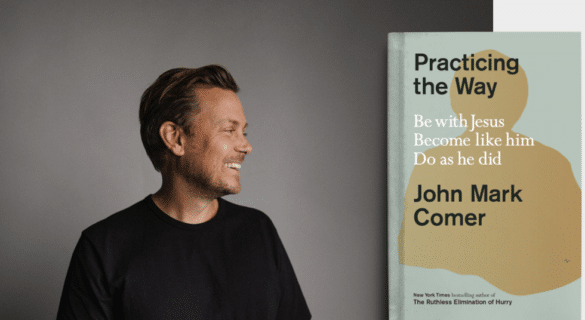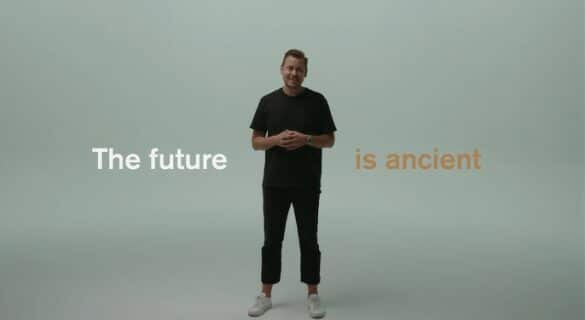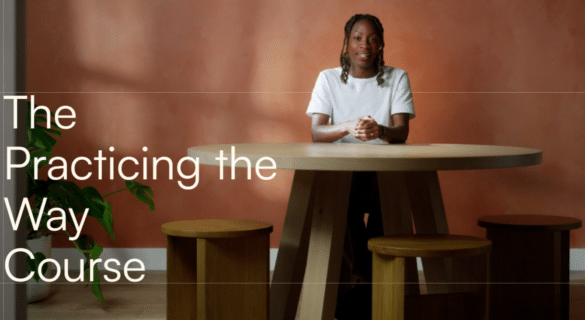Deepening your walk with Jesus
What if someone told you that most Christians are not following Jesus?
That’s what John Mark Comer says in his book, Practicing the Way (2024).
He calls this widespread attitude, “salvation by minimal entrance requirements”. We say the sinner’s prayer, show up at church, give some money and occasionally pray. But that doesn’t make you a follower of Jesus, says Comer. It just makes you someone who agrees with him. Jesus never asked for agreeable people. (He never asked for “Christians” either – a word you rarely find in the New Testament). He asked for followers, and that’s different.
What’s wrong with being an agreeable Christian? That sounds easier, right? Being a follower sounds hard.
There is indeed a cost to being a follower. But, says Comer, there is a bigger cost to not being a follower. Not being a follower means we lose out on the fulness of life God wants for us. We miss out on the joy of abiding in God through the day. It means we say “no” to the peace that transcends understanding, we give up the freedom from bondage to sin, we forgo the very purpose for which God created us.
Becoming a follower — being “formed by Jesus” — is what this book is all about. “We are all being formed by something”, says Comer, meaning we are being shaped by the world – our job, family, online games, Netflix, boy/girlfriends…whatever. Many of those things are fine, even good, but if Jesus was being serious when he said: “whoever wants to save their life will lose it, but whoever loses their life for me will find it” (Matthew 16:25) then “why not be a person formed by Jesus?” he asks.
Why not be a person formed by Jesus?
But how do we do this? Is there a new, secret method? The best part of this book is: no, there really isn’t.
Becoming apprenticed to Jesus
Comer proposes that being a follower of Jesus today is best encapsulated by the idea of being an apprentice. An apprentice doesn’t simply acquire head knowledge, or show up once a week for a session. Apprenticing is the practical task of learning from the master craftsman. It’s watching what they do and then copying. It’s about training, under the gaze of the master, not trying in our own strength.
Apprenticing to Jesus means being with Jesus, becoming like Jesus, and doing the things that Jesus did. None of that is revolutionary – this book doesn’t try to invent anything. Rather, it’s “a summary and synthesis of ancient Christian orthodoxy” for a 21st-century audience.
Comer highlights nine ancient practices apprentices of Jesus must become trained in, but with a new perspective. He makes them relatable and achievable. These are: Sabbath, Solitude, Scripture, Generosity, Prayer, Community, Fasting, Witness, and Service. Some of these will sound daunting, but he provides immensely practical advice on how to start them, and how to sustain them.
For example, he advises, start where you are right now, not where you think you should be. In other words, don’t suddenly decide to pray for an hour a day if you’ve never done that. Start with a few minutes, let that be enough (but show up to do it!). Or, if you can’t stop binging Netflix for 2 hours a day, could you give God a tithe of that time back? And, he suggests the charming idea of “parenting your phone” – putting it to bed at 8pm, not waking it up till 7.30am.
And on that most terrifying of spiritual practices, witnessing, he reminds us, “you are not the sales guy closing the deal”. In other words, you don’t have to drag a person to church and force a sinner’s prayer out of their mouth. You only have to witness — and he makes simple suggestions of how to do that.
As follower of Jesus we learn to abide in Jesus throughout the day, turning our face toward him whether we’re on the morning commute, opening our Inbox, popping to the shops, or sipping a cup of tea. Comer calls this: “turning God into a habit” or, as the 17th century Brother Laurence said, “practicing the presence of God”.
Plan to become a follower of Jesus
Most people have plans. We plan our finances, work schedules, exercise regimes, meals, education, even our retirement. “But”, says Comer, “very few of us have a plan to be with Jesus, and thoughtfully apprentice under him”.
Most Christians are not followers of Jesus
Here again Comer goes back to an ancient tradition. The “Rule of Life” is a practice that has its roots in the early centuries of the church. Simply put, a rule of life is a blueprint for balancing your life around Jesus. It’s a plan to follow Jesus taking into account the nine practices but also the season of life you are in, and the kind of person you are. It’s not just for monks and nuns!
This requires us to commit — Comer points out that following Jesus has to mean more to us than a pastime. So a Rule of Life isn’t a magic wand, but it is a tried and tested way that our Christian forbears followed Jesus.
Personal opinion
For me, reading this book was a rollercoaster I found myself thinking “this could be transformational”, followed a few chapters later by “nope, this is impossible”, followed yet later still by “no it is transformational”. But isn’t that the very essence of Jesus’ call? I’m sure that’s how the first disciples felt as they stood by the Sea of Galilee and considered the merits, and the costs, of following this man.
Being honest, many of us avoid books like this. Why? Because it looks like yet another way to beat ourselves up for not being a good enough follower of Jesus. Another way to fail as a Christian. But this book isn’t one to avoid. Comer works hard to make following Jesus practical and accessible in our modern day. I like a book that tries to takes the pressure off, while simultaneously challenging me to step up.
One criticism I have is that I would like to have seen more material for people in difficult life-circumstances, from the mum struggling to raise kids and follow Jesus, to the young man caught up in pornography feeling Jesus doesn’t want him anyway. And it would be good to hear stories from churches where Practicing The Way has moved the needle on whole-church discipleship, as well as churches where it didn’t hit the mark. But I understand a lot of this is covered in the resources available at https://www.practicingtheway.org/
There is a cost to being a follower, but a bigger cost to not being a follower
Lastly, while researching for this article, something odd happened.
I accidentally stumbled across a Rule of Life that I had written for myself 15 years ago (2009) and completely forgotten. I must have attended some Christian conference, come home brimming with enthusiasm, and written it up – only I don’t remember. Anyway, my heart sank when I saw it … another botched attempt to follow Jesus. But then, on opening the document and reading the 7 ideas from a younger me, immersed in career and family, I realised I am now doing almost all those things. They were not ground-breaking … reading the Bible organising a regular family time … etc. But I can tell you, it wasn’t easy back then. Yet somehow, they became ingrained in me, they became part of my life, and then I forgot about the “rule” … which is fine! Today, in a different season of life, it’s time to write a new one.
This article was written for Premier Christianity online and a reduced version appears in Christianity Magazine (April 2024). All Chris’s work for Premier can be found here.
If you enjoyed reading this, try Whats the most important thing a Christian can do?




Thanks for this Chris, I must get the book. One of my biggest regrets is not practising enough on being a Christian during my working life. I thought I was but now I am retired I have realised I didn’t rely on Jesus nearly enough and that he could have made my life so much richer and easier if only I had let him. Hopefully I am back on the right road leaning on him every step of the journey.
Peter that is quite amazing, I could have written those exact words, I retired just before Covid in the UK and the Lord introduced me to practices of prayer and bible study which revolutionised my Christian discipleship and I think perhaps that this book will reinforce that.
Good to hear. I think there is always more we can do to follow Jesus better and we shouldn’t necessarily feel guilty about that, God is patient and welcomes thos with this atitude. This book is more trying to address the complete “disconnect” between the attitude of many Christians — “I’m a Christian and I’ll be OK” — compared to actually following Jesus in any serious way at all.
Hello Chris — yes, challenging for me and many many Christians I guess! As a fairly elderly person, I’m learning to be a child again where trust is concerned. Old age is challenging and this author gives much food for thought. However can I give the thumbs up to a radio 4 programme which has been on all week on ‘Trust’ because it’s relevant to some of your input on AI Chris. Today there were some very challenging thoughts on why we should not trust AI automatically as some are inclined to do because it’s the latest ‘tecky’ thing! thanks… Read more »
Thaks for your (as always) helpful comments Tina. FYI my daughter sent me a meme on AI. I said .… “You know the biggest problem with all this AI talk? Wrong direction. I want AI to do my laundry and dishes so that I can do my art and writing, NOT for AI to do my art and writing so that I can do my laundry and dishes” … 🙂
Love it — this book sounds like the real deal, true discipleship, laying everything aside to be in the presence of Jesus, to be like Jesus. We are His bride after all, surely longing for Him is at the core of our being. Good blog btw
And thanks for reading Andea 🙂
Wow
That’s difficult stuff Chris
As always thought provoking but very very difficult
Like my school report
Must try harder
Many thanks!